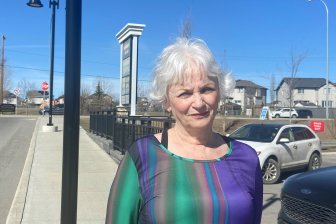Winnipeg’s battle to end chronic homelessness continues.
On Monday, more than 100 advocates for the unhoused community gathered for a symposium in Winnipeg at the Canadian Museum of Human Rights as a part of that fight.
A major goal was to hear from people with lived experience of homelessness, like Jacob Kaufman.
“The unsheltered community know what they want. They want their voices heard. It’s them; they have the solution,” Kaufman said.
What they want, he said, is housing.
Al Wiebe, who organized the event, said effective housing policy is on everybody’s mind.
“What the city needs to do is have a direct policy focusing first on low-income housing. (It’s) 30 per cent of whatever you’re making, whether you’re on welfare or not. Thirty per cent. They need to absolutely have a focus on that number,” he said.
To help, there should be an effort to build more housing stock, he said, and get unhoused people into empty units.
Vanessa Gamblin director of Indigenous relations for Main Street Project, said policy language should leave no room for inaction.
“When we talk about the right to housing, there (are) words in there that allow room to not implement right to housing,” for example, “the word ‘ought’ is in there.”
Gamblin said housing becomes more effective when people experiencing homelessness are empowered to speak up and share their input on how these spaces should be run.
More on Canada
She said people succeed when they feel safe and accepted.
“Their own truth comes, and you’ll hear through that knowledge, they’re providing answers,” she said.
Kaufman said those answers involve catering to specific and complex needs.
“Houses where it’s OK to use whatever they choose to use. Housing that is sober for people who have extreme addiction issues and want to get over that,” he said.
There are no simple solutions, but advocates say it’s possible by working together.
— with files from Global’s Katherine Dornian

© 2024 Global News, a division of Corus Entertainment Inc.


